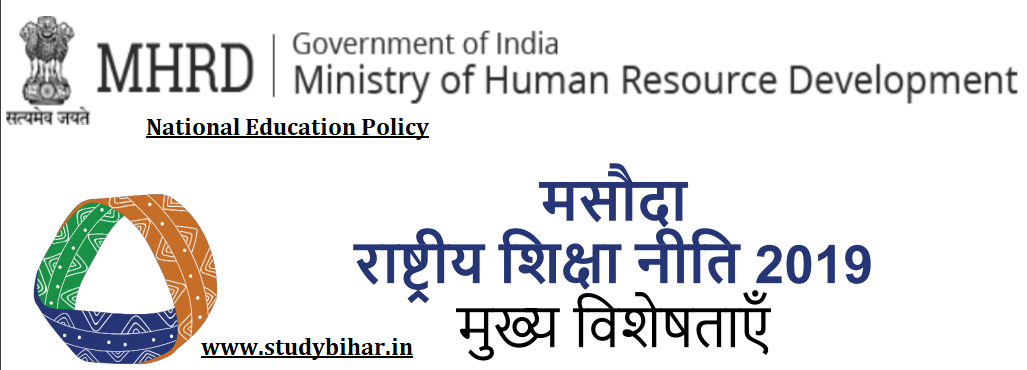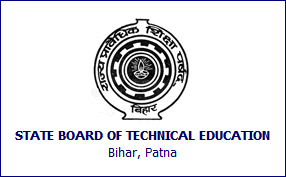Ministry of Human Resource Development
National Education Policy (NEP) 2019
Salient Features of NEP
www.studybihar.in
अगर आप हिंदी (Hindi) में देखना चाहते हैं तो यहाँ Click करें
Cabinet Approves National Education Policy 2020, paving way for transformational reforms in school and higher education systems in the country.
This is the first education policy of the 21st century and replaces the thirty-four year old National Policy on Education (NPE), 1986. Built on the foundational pillars of Access, Equity, Quality, Affordability and Accountability, this policy is aligned to the 2030 Agenda for Sustainable Development and aims to transform India into a vibrant knowledge society and global knowledge superpower by making both school and college education more holistic, flexible, multidisciplinary, suited to 21st century needs and aimed at bringing out the unique capabilities of each student.
- New Policy aims for Universalization of Education from pre-school to secondary level with 100 % GER in school education by 2030
- NEP 2020 will bring 2 crore out of school children back into the main stream
Changes in Education System through National Education Policy (NEP)
- New 5+3+3+4 school curriculum with 12 years of schooling and 3 years of Anganwadi/ Pre-schooling.
- The 10+2 structure of school curriculum is to be replaced by a 5+3+3+4 curricular structure corresponding to ages 3-8, 8-11, 11-14, and 14-18 years respectively.
- Students will have increased flexibility and choice of subjects.
- There will be no rigid separations between arts and sciences, between curricular and extra-curricular activities, between vocational and academic streams.
- Vocational streams in schools ; Vocational Education to start from Class 6 with Internships
- Open learning for classes 3,5 and 8 through NIOS and State Open Schools
- Secondary education programs equivalent to Grades 10 and 12, vocational courses, adult literacy and life-enrichment programs.
Education System for the Children upto 8 Years :
- NCERT will develop a National Curricular and Pedagogical Framework for Early Childhood Care and Education (NCPFECCE) for children up to the age of 8 .
- ECCE will be delivered through a significantly expanded and strengthened system of institutions including Anganwadis and pre-schools that will have teachers and Anganwadi workers trained in the ECCE pedagogy and curriculum.
- The planning and implementation of ECCE will be carried out jointly by the Ministries of HRD, Women and Child Development (WCD), Health and Family Welfare (HFW), and Tribal Affairs.
Teacher Education :
- A new and comprehensive National Curriculum Framework for Teacher Education, NCFTE 2021, will be formulated by the NCTE in consultation with NCERT.
- By 2030, the minimum degree qualification for teaching will be a 4-year integrated B.Ed. degree .
- Stringent action will be taken against substandard stand-alone Teacher Education Institutions (TEIs).
Financial support for students :
- Efforts will be made to incentivize the merit of students belonging to SC, ST, OBC, and other SEDGs.
- The National Scholarship Portal will be expanded to support, foster, and track the progress of students receiving scholarships.
- Private HEIs will be encouraged to offer larger numbers of free ships and scholarships to their students
Professional Education :
- All professional education will be an integral part of the higher education system.
- Stand-alone technical universities, health science universities, legal and agricultural universities etc will aim to become multi-disciplinary institutions.
Open and Distance Learning :
- This will be expanded to play a significant role in increasing GER.
- Measures such as online courses and digital repositories, funding for research, improved student services, credit-based recognition of MOOCs, etc., will be taken to ensure it is at par with the highest quality in-class programmes.
Online Education and Digital Education:
- A comprehensive set of recommendations for promoting online education consequent to the recent rise in epidemics and pandemics in order to ensure preparedness with alternative modes of quality education whenever and wherever traditional and in-person modes of education are not possible, has been covered.
- A dedicated unit for the purpose of orchestrating the building of digital infrastructure, digital content and capacity building will be created in the MHRD to look after the e-education needs of both school and higher education.
-
Teaching upto at least Grade 5 to be in mother tongue/ regional language
-
Assessment reforms with 360 degree Holistic Progress Card, tracking Student Progress for achieving Learning Outcomes
-
GER in higher education to be raised to 50 % by 2035 ; 3.5 crore seats to be added in higher education
-
Multiple Entry / Exit to be allowed with appropriate certification
-
Academic Bank of Credits to be established to facilitate Transfer of Credits
-
National Research Foundation to be established to foster a strong research culture
-
Light but Tight Regulation of Higher Education, single regulator with four separate verticals for different functions
-
Affiliation System to be phased out in 15 years with graded autonomy to colleges
-
NEP 2020 advocates increased use of technology with equity; National Educational Technology Forum to be created
-
NEP 2020 emphasizes setting up of Gender Inclusion Fund, Special Education Zones for disadvantaged regions and groups
-
New Policy promotes Multilingualism in both schools and HEs; National Institute for Pali, Persian and Prakrit , Indian Institute of Translation and Interpretation to be set up






